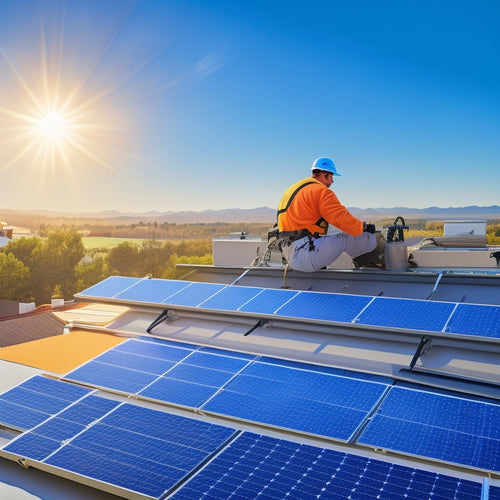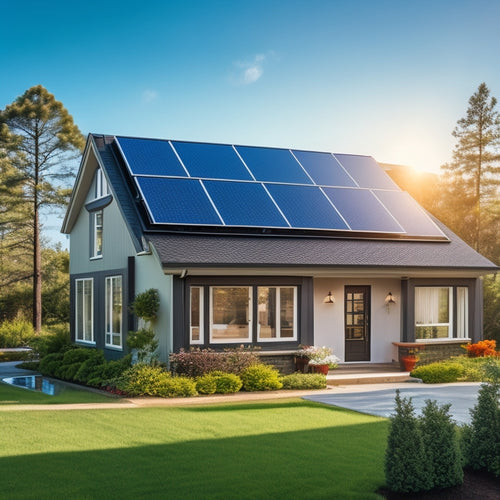
Comprehensive Guide to Solar Energy Systems in Homes
Share
You're considering installing a solar energy system in your home, which means you're part of a growing movement to reduce reliance on the electrical grid and promote sustainability. Solar energy systems consist of photovoltaic panels and inverters, converting sunlight into electricity for home use. By understanding the types of systems, benefits, and installation process, you can make an informed decision about utilizing renewable energy. As you investigate the world of solar energy, you'll reveal the complexities of system efficiency, performance metrics, and financing options, and find out how to access the full potential of solar power for your home – and there's more to investigate ahead.
Key Takeaways
- Solar energy systems consist of photovoltaic panels and inverters, reducing reliance on the electrical grid and promoting sustainability.
- Off-grid, hybrid, and grid-tied systems cater to different energy needs, budgets, and preferences, offering flexibility and customization.
- Solar energy benefits homes by reducing energy bills, contributing to a sustainable future, and increasing property value by up to 17%.
- Financing options, including solar loans, incentives, and rebates, make solar energy systems more accessible and affordable for homeowners.
- Proper installation, maintenance, and monitoring are crucial to ensure optimal system efficiency and longevity, maximizing energy production and savings.
Understanding Solar Energy Systems
A solar energy system, comprising photovoltaic (PV) panels and an inverter, converts sunlight into electrical energy for your home. This system utilizes the power of sunlight, which is abundant and renewable, to generate electricity.
You may have heard some solar energy misconceptions, such as the notion that it's too expensive or inefficient. However, recent solar technology advancements have made solar energy systems more efficient, affordable, and accessible.
The PV panels, typically installed on your rooftop, convert sunlight into direct current (DC) electricity. The inverter then converts the DC power into alternating current (AC) electricity, which is compatible with your home's electrical system.
This AC power is then fed into your electrical panel, where it can power your appliances, lights, and other devices. With a solar energy system, you can reduce your reliance on the grid and enjoy a cleaner, more sustainable source of energy.
Benefits of Solar Energy for Homes
You're likely to reap several benefits by installing a solar energy system in your home.
For starters, you'll enjoy reduced energy bills since you'll be generating your own electricity.
Additionally, you'll be adopting an environmentally friendly option and increasing your property value.
Reduced Energy Bills
Frequently, homeowners who invest in solar energy systems experience a significant decrease in their energy bills. You'll notice a substantial reduction in your utility bills as you generate your own clean energy. With solar panels installed, you'll be utilizing the sun's energy to power your home, reducing your reliance on the grid. This translates to considerable energy savings over time.
As you produce your own energy, you'll be offsetting the amount of electricity you consume from the grid. This means you'll be paying less for your utility bills, freeing up more money in your budget for other essential expenses. Depending on your energy usage and the size of your solar energy system, you could potentially save hundreds or even thousands of dollars annually.
The exact amount of energy savings you'll enjoy will depend on various factors, including your location, energy consumption patterns, and the quality of your solar energy system.
However, with a well-designed and installed system, you can expect significant reductions in your energy bills, providing you with long-term financial benefits and a sense of independence from the grid.
Environmental Friendly Option
Beyond the financial benefits, homeowners who invest in solar energy systems can take satisfaction in doing their part for the environment.
You're not only reducing your energy bills, but also contributing to a more sustainable future. By utilizing the power of the sun, you're generating clean and renewable energy, reducing your reliance on fossil fuels and lowering your carbon footprint.
As you switch to solar energy, you're supporting eco-friendly solutions that benefit the planet.
You're reducing greenhouse gas emissions, mitigating climate change, and promoting a healthier environment for future generations.
With solar energy, you're producing sustainable energy that's gentle on the planet, reducing air and water pollution, and preserving natural resources.
Increased Property Value
Investing in a solar energy system can greatly enhance your property's worth, making it more attractive to potential buyers if you decide to sell in the future.
According to recent solar market trends, homes with solar energy systems can sell for up to 17% more than similar homes without them. This increased worth is due to the numerous benefits that solar energy provides, including reduced energy bills and a smaller carbon footprint.
When it comes to property appraisal, solar energy systems are taken into account as a significant asset.
Appraisers consider the system's age, quality, and condition, as well as its ability to generate electricity and reduce energy costs. As a result, your property's worth will increase, making it more appealing to potential buyers.
Types of Solar Panel Systems
You have several options when it comes to solar panel systems, each with its own advantages and disadvantages. The type of system you choose depends on your energy needs, budget, and personal preferences.
Off-grid systems are ideal for remote locations where connecting to the grid isn't feasible. These systems store excess energy in batteries for later use, making them suitable for homes with limited grid access.
Hybrid systems, on the other hand, combine solar power with other energy sources, such as wind or fossil fuels, to provide a reliable energy supply. They're perfect for homes that require a steady power supply, even during periods of low sunlight.
Grid-tied systems, which are the most common, feed excess energy back into the grid and allow you to offset your energy bills. You can also opt for a grid-tied system with energy storage, which provides backup power during outages.
How Solar Energy Systems Work
During the day, when sunlight hits your solar panels, it excites the electrons in the photovoltaic (PV) cells, generating a direct current (DC) electrical output.
This DC power is then sent through an inverter, which converts it into alternating current (AC) electricity, making it usable in your home.
-
The AC power is now compatible with your home's electrical system, allowing you to power your appliances, lights, and devices.
-
Any excess energy produced by your solar panels is fed back into the grid through a process called net metering, which offsets your energy consumption during periods of low sunlight or at night.
-
As a result, you'll reduce your reliance on traditional fossil fuels and lower your carbon footprint, contributing to a cleaner environment and a more sustainable future.
Cost and Financing Options
You're likely wondering how much it'll cost to install a solar energy system in your home and how you'll finance it.
Upfront system costs can be significant, but various financing options, such as solar loans, can help spread the expense over time.
Additionally, incentives and rebates can reduce the overall cost, making solar energy a more accessible option for homeowners like you.
Upfront System Costs
Investing in a solar energy system for your home often begins with a significant upfront cost, which can be a major deterrent for many homeowners.
However, it's vital to evaluate the long-term benefits and savings that come with utilizing clean energy.
The upfront cost of a solar energy system typically includes:
- System components: The cost of solar panels, inverters, mounting hardware, and other equipment necessary for the system.
- Installation labor: The cost of hiring a professional installation team to set up and integrate the system with your home's electrical infrastructure.
- Permitting and inspections: The cost of obtaining necessary permits and undergoing inspections to guarantee compliance with local building codes and regulations.
While the initial investment may seem steep, it's paramount to remember that solar energy systems can last for 25 years or more, providing a significant return on investment through reduced energy bills and increased property value.
Additionally, technology advancements have led to more efficient and affordable systems, making solar energy a more accessible option for homeowners.
Financing Solar Loans
Freedom from hefty upfront costs can be achieved through various financing options, allowing homeowners to harness the power of solar energy without breaking the bank.
You can choose from different solar loan types, each catering to specific financial needs and goals. One popular option is the secured solar loan, which uses your home as collateral in exchange for lower interest rates and longer repayment terms.
Unsecured solar loans, on the other hand, don't require collateral but often come with higher interest rates and shorter repayment periods.
You can also investigate financing options through solar panel manufacturers, installers, or third-party providers. Some offer zero-down financing, while others provide financing through partnerships with banks or credit unions.
Additionally, you may be eligible for property assessed clean energy (PACE) financing, which allows you to repay the loan through your property taxes.
Incentives and Rebates
Tap into the benefits of solar energy installations and reap the rewards of incentives and rebates, which can greatly reduce the upfront costs. You can markedly lower your expenses by taking advantage of these offers.
-
Federal Incentives: The federal government provides a 26% tax credit for residential solar installations, allowing you to claim a considerable portion of your solar investment as a credit against your tax liability.
-
State and Local Rebates: Many states and local governments offer rebates, tax credits, or other incentives to encourage the adoption of solar energy. These can range from a few hundred dollars to several thousand dollars.
-
Utility and Community Solar Incentives: Some utilities offer special rates or credits for solar-powered homes, while community solar programs provide a shared solar energy experience for multiple homeowners.
Additionally, you may be eligible for solar grants, installation credits, and energy efficiency incentives.
Net metering policies also allow you to sell excess energy back to the grid and offset your electricity bills. By combining these incentives, you can maximize your savings and make your solar energy system more affordable.
Installation and Maintenance Process
The installation process of a solar energy system in your home typically begins with a site assessment, where a professional evaluates your property's solar potential and identifies the best location for the system.
After the assessment, the installation team will prepare your roof for panel installation, making sure it meets safety standards. The panels are then installed, followed by the setup of the inverter and electrical connections.
Once the system is installed, you'll need to monitor its performance to guarantee it's generating power efficiently. Your installer will set up a system monitoring platform, allowing you to track your energy production and identify any potential issues.
To maintain your system's performance, you'll need to follow a maintenance schedule, which may include regular cleaning and inspections. In case of any issues, your installer should provide troubleshooting support.
Additionally, they should perform inverter replacement as needed to optimize your system's performance. By following these steps, you can guarantee your solar energy system operates safely and efficiently, providing you with clean power for years to come.
Factors Affecting System Efficiency
How efficiently does your solar energy system convert sunlight into electricity? Several factors can impact the performance of your system, and understanding them is vital to maximizing energy production.
-
Panel Quality and Inverter Efficiency: High-quality panels with high conversion rates will generally produce more electricity. Similarly, an efficient inverter will minimize energy losses during the conversion process.
-
Installation Location and Orientation Angle: The location and angle of your solar panels can greatly affect energy production. Shading from trees, buildings, or other obstructions can reduce energy output, while an ideal orientation angle can increase it.
-
Temperature Effects and System Design: High temperatures can reduce panel efficiency, so it's important to design your system with temperature effects in mind. Proper system design, including energy storage solutions, can also help mitigate these losses.
Additionally, other factors like shading impact, installation location, and system design can also influence your system's efficiency. By considering these factors, you can enhance your solar energy system to produce maximum power and reduce energy losses.
Measuring System Performance Metrics
Measuring System Performance Metrics
What metrics do you use to gauge the performance of your solar energy system? Establishing performance benchmarks is vital to guarantee your system operates at its best. You'll want to track efficiency metrics that provide understanding into your system's energy output, reliability, and overall performance.
One key metric is the capacity factor, which measures the ratio of actual energy production to the system's theoretical maximum output. A higher capacity factor indicates better system performance.
You should also monitor the system's efficiency, typically expressed as a percentage of the total irradiance converted into electrical energy. Other important metrics include the performance ratio, which compares actual energy production to the expected output under ideal conditions, and the inverter efficiency, which measures the inverter's ability to convert DC power to AC power.
Regularly monitoring these metrics enables you to identify potential issues, enhance system performance, and maximize your return on investment.
Frequently Asked Questions
Can I Install Solar Panels on My Own or Diy?
Fasten your astronaut helmet, because you're about to blast off into the world of solar panel installation! While it's technically possible to DIY solar systems, you'll likely need an electrician's knowledge to guarantee a safe, efficient, and code-compliant installation - so, can you really do it on your own?
Do Solar Panels Generate Power During a Blackout?
You won't have power during a blackout with traditional grid-tied solar panels, but you can achieve grid independence with battery storage, ensuring you generate power even when the grid is down, providing you with reliable energy.
How Do I Clean and Maintain Solar Panels?
"An ounce of prevention is worth a pound of cure." You'll maximize your solar panel's efficiency by cleaning them regularly, ideally every 6 months, using a soft-bristled brush and distilled water, and following maintenance tips like inspecting for debris and tightening loose connections.
Can I Use Solar Energy to Charge My Electric Car?
You can absolutely use solar energy to charge your electric vehicle; with a solar charging system, you'll capture renewable energy to fuel your car, reducing emissions and reliance on the grid, and increasing your energy independence.
Will Solar Panels Increase My Property's Resale Value?
"When it rains, it pours" - your solar investment will likely enhance your property's resale value. According to property appraisal experts, solar panels can increase your home's value by up to 4.1%, making it more attractive to potential buyers.
Related Posts
-

Top 10 DIY Conversion Kit Reviews and Tips
You're taking the first step towards electrifying your ride, and with the right DIY conversion kit, you'll be cruisin...
-

3 Essential Steps for Solar Electricity Installation
To guarantee a successful solar electricity installation, you'll need to follow three essential steps. First, assess ...
-

Solar Power Units Perfect for Homes
You're considering installing a solar power unit in your home, a decision that can notably reduce your reliance on tr...


